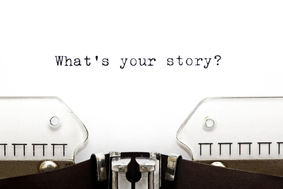
"The How and Why of Telling a Sib’s Story"
By Stacey Gruber
Writing has never come easily to me. In fact, expressing myself in any way has never come easily to me. But as I’ve grown and confronted realities of my past, present, and future as a sibling, I’ve realized that sharing my unique story is so important. People who don’t have an experience as a sibling of a person with disabilities sometimes never think about how our lives are different – and at the same time the same – in so many ways. Everyone has a story, and it’s empowering to share it so that others can have a glimpse of life as you know it. I’ve learned that my story can impact clinicians, policy, community organizations, and society as a whole just from one single ripple effect. Combined with so many others that are creating their own ripples, we have a way to create a wave of change that is meaningful to ourselves and our siblings…. but that doesn’t mean it’s easy to do. For a long time I was afraid. So in my first official writing as a board member of Siblings with a Mission I thought I’d share some of the reasons why it was so difficult for me to open up about being a sib in hopes that all the other sibs out there might overcome these fears and write more stories – as short as a sentence or as long as a book.
1) In the beginning one of the main reasons I didn’t share so openly is because I thought other sibs before me had said it all before in a more elegant way than I ever could (remember that whole words-are-not-my-friends thing?). I also didn’t want to speak for every person that has ever been a sibling. My opinions are my own; I don’t speak as the one united front of siblings worldwide. After working actively in this field for a few years now, I know that these are not reasons not to share. My unique voice can connect better with some audiences that haven’t received these messages yet. Even if what I say doesn’t reflect the opinions of all other siblings, it probably resonates with at least a few, and at the very least it gets people talking about siblings!
2) I don’t want my sibs and parents to feel guilty for something that none of us can control (as if we don’t already feel guilty for enough). Some of the realities of our world are tough, but that’s even more of a reason to share. The best thing I’ve learned to counter this guilt is to be open with my sibling and family about what I’m going to share before I share it.
3) I also struggle with how to accurately capture all the facets of my life and my sibling’s life. Part of the complexity of the situation gets lost, and it doesn’t feel like a complete story. I don’t want people to think that life as a sibling is all peaches, roses, and heroic stories of personal growth and triumph. But I also don’t want them to think that it’s always terrible, either. I want them to know it’s different, and I want them to appreciate that difference in a way that probably isn’t possible for someone disconnected from the disability community. It’s an unfair expectation for me to have, but I do anyway. Sharing more of my life with the outside world – even if it is in small snippets – will help close the gap. Beyond that, it has helped me connect with support networks.
4) Finally, and most difficult for me, is that I don’t want to exploit my sib. I don’t want to over-share something that is personal to him or to use his condition as a way for myself to achieve more prominence or get perks. Part of it is that I want to protect him and part of it is that I want to earn prominence on my own, regardless of my identity as a sib. But alas, I am a sib. It’s weaved into my being. If people pity me, respect me, or anything else, I don’t care anymore. I am doing this work because I want to, because I can clearly see the problems in the world (not the problems with my brother). I don’t advocate because my brother wants me to or because I feel the need to do it just for him. In contrast, I feel the need to do this work for the enlightenment of “able-bodied” people of the world.
In the end, people connect to and remember stories. These stories need to be heard to change policy, to change perception, and to change outcomes for our siblings. Self-expression helps one to understand yourself and grow from your experiences. It is one of the best gifts you can give to yourself, your sibling, and the community of siblings who has experienced similar things.
Here at Siblings with a Mission, we want you to be able to express yourself in whatever way you are most comfortable. For me personally, the hardest times are also the times that I tend to shut down. I distance myself from family and friends, only magnifying the problem. If you ever feel this way, come to us for support! Sharing your story to an accepting, attentive audience can be just the right remedy.
Click this link to share a story. Your posts can always be as long or as short as you choose and can be anonymous. For more suggestions about how to start writing a story, click here.
By Stacey Gruber
Writing has never come easily to me. In fact, expressing myself in any way has never come easily to me. But as I’ve grown and confronted realities of my past, present, and future as a sibling, I’ve realized that sharing my unique story is so important. People who don’t have an experience as a sibling of a person with disabilities sometimes never think about how our lives are different – and at the same time the same – in so many ways. Everyone has a story, and it’s empowering to share it so that others can have a glimpse of life as you know it. I’ve learned that my story can impact clinicians, policy, community organizations, and society as a whole just from one single ripple effect. Combined with so many others that are creating their own ripples, we have a way to create a wave of change that is meaningful to ourselves and our siblings…. but that doesn’t mean it’s easy to do. For a long time I was afraid. So in my first official writing as a board member of Siblings with a Mission I thought I’d share some of the reasons why it was so difficult for me to open up about being a sib in hopes that all the other sibs out there might overcome these fears and write more stories – as short as a sentence or as long as a book.
1) In the beginning one of the main reasons I didn’t share so openly is because I thought other sibs before me had said it all before in a more elegant way than I ever could (remember that whole words-are-not-my-friends thing?). I also didn’t want to speak for every person that has ever been a sibling. My opinions are my own; I don’t speak as the one united front of siblings worldwide. After working actively in this field for a few years now, I know that these are not reasons not to share. My unique voice can connect better with some audiences that haven’t received these messages yet. Even if what I say doesn’t reflect the opinions of all other siblings, it probably resonates with at least a few, and at the very least it gets people talking about siblings!
2) I don’t want my sibs and parents to feel guilty for something that none of us can control (as if we don’t already feel guilty for enough). Some of the realities of our world are tough, but that’s even more of a reason to share. The best thing I’ve learned to counter this guilt is to be open with my sibling and family about what I’m going to share before I share it.
3) I also struggle with how to accurately capture all the facets of my life and my sibling’s life. Part of the complexity of the situation gets lost, and it doesn’t feel like a complete story. I don’t want people to think that life as a sibling is all peaches, roses, and heroic stories of personal growth and triumph. But I also don’t want them to think that it’s always terrible, either. I want them to know it’s different, and I want them to appreciate that difference in a way that probably isn’t possible for someone disconnected from the disability community. It’s an unfair expectation for me to have, but I do anyway. Sharing more of my life with the outside world – even if it is in small snippets – will help close the gap. Beyond that, it has helped me connect with support networks.
4) Finally, and most difficult for me, is that I don’t want to exploit my sib. I don’t want to over-share something that is personal to him or to use his condition as a way for myself to achieve more prominence or get perks. Part of it is that I want to protect him and part of it is that I want to earn prominence on my own, regardless of my identity as a sib. But alas, I am a sib. It’s weaved into my being. If people pity me, respect me, or anything else, I don’t care anymore. I am doing this work because I want to, because I can clearly see the problems in the world (not the problems with my brother). I don’t advocate because my brother wants me to or because I feel the need to do it just for him. In contrast, I feel the need to do this work for the enlightenment of “able-bodied” people of the world.
In the end, people connect to and remember stories. These stories need to be heard to change policy, to change perception, and to change outcomes for our siblings. Self-expression helps one to understand yourself and grow from your experiences. It is one of the best gifts you can give to yourself, your sibling, and the community of siblings who has experienced similar things.
Here at Siblings with a Mission, we want you to be able to express yourself in whatever way you are most comfortable. For me personally, the hardest times are also the times that I tend to shut down. I distance myself from family and friends, only magnifying the problem. If you ever feel this way, come to us for support! Sharing your story to an accepting, attentive audience can be just the right remedy.
Click this link to share a story. Your posts can always be as long or as short as you choose and can be anonymous. For more suggestions about how to start writing a story, click here.
Siblings with a Mission is a non-profit, international organization established to serve and support siblings of individuals with special needs. All images are found on Google images and are solely used for education purposes. The stories and advice provided by Siblings with a Mission are not to be replaced by professional advice and counseling but to be considered as an additional source of support.

